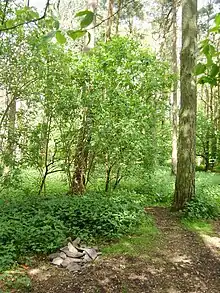Dunmallet
Dunmallet[1] or Dunmallard Hill[2] is a small hill in the English Lake District, near Pooley Bridge, Cumbria. It is the subject of a chapter of Wainwright's book The Outlying Fells of Lakeland.[1] It reaches 775 feet (236 m) and Wainwright describes the ascent, from Pooley Bridge, as a "simple after-dinner stroll". He lists two other early spellings: Dunmalloght and Dunmallock The hill is wooded and the views from the top limited.[1]

Remains of an Iron Age hill fort have been detected on the hill.[3]
Etymology
The name Dunmallet or Dunmallard may either be of Brittonic or Middle Irish origin.[4] The most likely derivation is from Irish dùn-mallacht, meaning "fort of curses".[4] Or else, the name may conserve a Brittonic formation of the elements dīn- ("fort") + mę:l ("bald") + -arδ ("height").[4]
References
- Wainwright, A. (1974). "Dunmallet". The Outlying Fells of Lakeland. Kendal: Westmorland Gazette. pp. 214–215.
- This name is used on Ordnance Survey 1:25,000 map.
- Historic England. "Dunmallard Hillfort (11131)". Research records (formerly PastScape). Retrieved 6 May 2012.
- James, Alan. "The Brittonic Language in the Old North" (PDF). Scottish Place Name Society. Retrieved 28 March 2021.